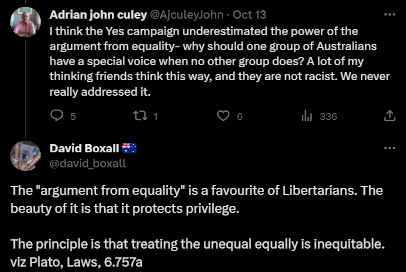
One of the objections raised to the recent referendum on Constitutional recognition of Australia's First Peoples was that all Australians should be treated equally:
What is “equality”? Does treating everyone “equally” give everyone a “fair go”?
“Nothing is more unequal than the equal treatment of unequal people.” Variations on that theme have been appearing in print since 1902, if not before. Even then, it wasn't new.
In the fourth century BCE, Plato wrote “Laws”. In book 6 of Laws, Plato writes: “when equality is given to unequal things, the resultant will be unequal”. This may well be the source of the above sentiment. He continues: “there are two kinds of equality which, though identical in name, are often almost opposites in their practical results”.
In “Politics”, Plato's student Aristotle writes: “equality is of two kinds”. The “arithmetical” equality which merely counts heads and treats all alike is here contrasted with that truer “proportional” equality which takes account of human inequality, and on which “distributive justice” (as Aristotle terms it) is based.
Two kinds of equality:-
Please note: Plato and Aristotle wrote in ancient Greek, at places and times very different to present-day Australia. Translation across those gulfs is fraught.
The Philosopher Redefining Equality, Annals of Thought, The New Yorker, 31 December 2018
A misguided sense of ‘equality’
This was a conception of equality controversially based on treating everyone the same, regardless of the different circumstances or particular disadvantages they face. But it appears to have resonated with the Australian people.
It was also a conception of equality that has long been used by the Coalition when dealing with Indigenous affairs. Writing of Indigenous policy during the Howard government era, academic commentator Jane Robbins wrote that the then Coalition government “interprets social unity as a form of equality based on identical treatment and uniform political processes”.
 This work is licensed under a Creative Commons Attribution 4.0 International License. |
Feedback: This e-mail address is being protected from spam bots, you need JavaScript enabled to view it. |